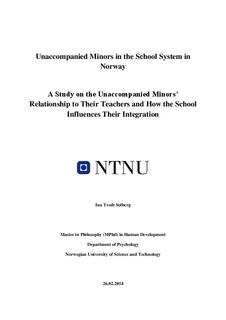Unaccompanied Minors in the School System in Norway: A Study on the Unaccompanied Minors’ Relationship to Their Teachers and How the School Influences Their Integration
Master thesis
Permanent lenke
http://hdl.handle.net/11250/271250Utgivelsesdato
2014Metadata
Vis full innførselSamlinger
- Institutt for psykologi [3103]
Sammendrag
The focus on this thesis is the relationship between unaccompanied minors and their teachers, and role the school has on the UM’s integration in Norway. An unaccompanied minor (UM) is a refugee arriving without parents or a legal guardian, and who is under 18 years. In this study I have conducted six interviews with immigrants that arrived as an UM. To analyse the data I have used Bronfenbrenner’s ecological model, as well as research on the relationship between the teacher and student.
The findings of this thesis suggest that teachers are important for the UM in the school. If the teacher is able to connect with the student, it will be easier to conduct the teaching in the classroom. However, for some students the teacher was more important, and was an adult that they could trust to share their problems with. According to the interviewees it was easy for them to see, based on facial expression, behaviour, and their tone of voice, if the teacher truly cared, or if it was their job to care. There are many things that the teacher can do to increase the probability of a relationship with the students, such as asking the UM how they are feeling after they have been sick. Most of the interviewees had established a relationship with a teacher that they felt they could trust in with their problems. The relationship with the teacher is not only influenced by the connection between these two people, but also by the other students in the classroom and adults that take over some of the parental responsibility of the child. Most of the UM in this study had a good relationship with their fellow students, although it was seldom that the whole class was together outside school.
This study indicates that the school is very important for integration. It is a place where the students learn language and culture of the new country, but it is also an important social arena. Most of the interviewees had friends that they met at school, although there are other places where they meet people. However, since most of the interviewees attended schools for immigrant they did not get the opportunity to meet Norwegian peers. For the UM, socialising with Norwegians would enhance their language and cultural understanding. Many of the interviewees had tried to establish relationships with peers at their football team or in other arenas, but it was difficult. Even though the interviewees were happy in Norway, they wanted to know more Norwegians as it would make their life better.
